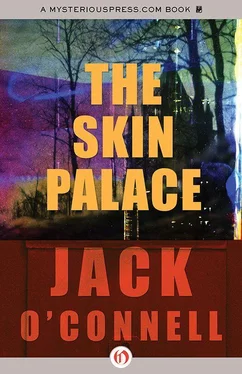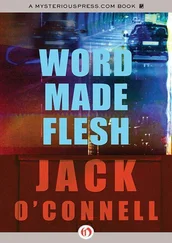“No, Papa,” Jakob says, pushing his hands into the pockets of his suitcoat. “Not at all.” He waits a moment, lets himself compose Felice’s face one last time. “There was a woman. Back in Maisel. She took care of me. She tried to help me. To teach me. She loved me.”
A long moment of hesitation until Hermann says, “The fishwife?”
“Her name was Felice, Papa. Don’t pretend you don’t remember.”
“The fishwife from the Schiller ghetto?”
“What happened to Felice, Papa?”
“That woman I hired to clean and cook for us? She was a maid, for God’s sake—”
“She was all I had.”
“She was twice your age, Jakob,” catching his breath, his hands on the back of the chair. “I had to dismiss her. I knew we were leaving for America. I had to let her go.”
“What did you do, Papa?” Jakob asks. “Does it matter so much if you tell me now?”
“We were making arrangements to leave. I couldn’t bring her with us, son. She was a bad influence on you. I could see what was happening. She infected you with her movie sickness. She had you at that theatre day and night. It wasn’t right. I couldn’t—”
“You killed Felice, didn’t you?”
“She was a victim of the pogroms. Like the others—”
“No,” Jakob yells, trembling. “Just say it. Just tell me. Pay me that little respect.”
Hermann has sat all night in the chapel trying to find another way, slouched before his desk like a well-tailored Abraham agonizing over his duty, choking on promises and vows and long-held notions of how the world is put together. And knowing that those long, tormented hours could only lead to this moment, when his hand edges up the flap on his jacket pocket and his fingers plunge into the felt and touch the always cold, twice-reinforced metal string of the Schonborn.
“I have told myself there was no other way. I have tried to convince myself that she was a very evil influence on my son, making him soft, filling the head with nonsense. I knew what she meant to you. I told myself I had to free you so you could start new here in the States.”
The hand withdraws the piano wire, loops ends around fingers.
“But I do owe you the truth. As my son, I owe you my honesty. And I have to confess, I know, without doubt, that I killed her, in part, as a touch of revenge, Jakob. For what happened at your birth. For how your life was traded for that of my wife.”
“Papa,” is all the boy can say and no matter how hard he attempts to restrain the muscle, tears well and start to roll from his eyes. Tears for Felice. And for his unknown mother. Maybe tears for Papa. Maybe even some for Felix.
Hermann steps back from the chair, raises his arms and starts to bring the garrote down to his son’s neck.
And he finds the barrel mouth of a revolver touching his throat at the Adam’s apple.
“Jakob,” he says.
Jakob swings out of the seat and around to face the old man. He wipes his eyes with the back of his free arm, and pushes the barrel tighter against the fat, fleshy throat.
“A gun?” Papa’s voice going high, his face actually brightening.
“Don’t you recognize it? It’s kind of a family heirloom.”
“You’re carrying a gun?” the meaning of the last several seconds still dawning on Hermann.
“Carrying is the easy part, Papa,” Jakob says and cocks the firing hammer. “Would you like to see me use it?”
The father’s hands come up to shoulder level as his fingers open and the length of the Schonborn drops to the floor.
“So, Felix is really—” the father begins and Jakob interrupts.
“You’re going to be shorthanded around here for a while, Papa. Just you and Gustav.”
“We’ll manage,” Hermann says, unable to contain the smile bursting over his face.
“This is what you wanted, isn’t it?” Jakob says, chinchucking the old man with the commandment’s pistol. “To see if I could do it? If I was capable?”
“You just told me what a brutal world we live in.”
Jakob lifts the gun from under the chin to an inch above the nose. He pushes the barrel in, applies pressure until Papa closes his eyes.
Then he uncocks the pistol and lays it down on the altar. His father’s chest heaves.
“I’m opening the wall safe on my way out,” the boy says. “I’m taking what I think is a fair amount. My birthright, so to speak. Enough to get me started. Tell Weltsch to keep an eye out for my company. It’s called Amerikan Pictures. We’ll be going public one of these days.”
“I’m sure you’ll make a fortune,” Hermann says. “I may want to invest myself.”
Jakob shakes his head, gently pushes his father aside and walks back to the door.
“I don’t think so,” he says, watching the old man sink back into shadow. “But come by sometime. I might put you in a movie.”
Sylvia walks out of the theatre blinking against the light, moves down the corridor and into Schick’s office. She goes to the bar, pours a glass of absinthe and looks at the couch. Resting on the cushions is the framed poster for Don Juan Triumphant. It depicts a teenage Leni Pauline, the Leni that existed seven years ago when the filming of the masterpiece first began, a Leni who still looked like a cheerleader-turned-bad and just off the bus, with the smooth ghost of baby fat only recently starting to fade from her face. She’s positioned on her knees in some vague period-costume, a sort of low-cut medieval gown that makes her breasts defy gravity. Her eyes don’t have any of their current hardness, their reflective calculation, and Sylvia wonders if this is the work of a talented airbrush artist or a true representation of the past.
She moves to Hugo’s desk and takes the massive seat, rests her drink in her lap, picks up a fat, bound script from the desk and reads
DON JUAN TRIUMPHANT
(revision 91, pink sheets)
“They have perfected a science of blinks”
— Geoffrey O’Brian
then opens to the last few pages and reads
554 INT/CLUB von SCHICK
Don Juan and Sylvia begin to rise back through the mouth of hell, all the while tangled in a passionate embrace. Sylvia becomes reanimated. Sylvia’s body is covered in reflective glitter. The couple begins to Tango.
She throws the script back on the desk, swivels the chair around, puts her feet up on the credenza and looks up at the rest of the framed posters from Schick’s seven self-proclaimed favorites. And there, in the space where Don Juan Triumphant had been, there’s the variant Madonna and Child. Maybe the one she saw in the lobby during her first visit. Maybe something new.
She closes her eyes and tries to imagine what the poster would look like for Perry and her movie.
Then she opens her eyes and stares at the Madonna’s face. And she knows it’s a forgery. It’s a talented attempt to reproduce an original Propp. But it’s not a Propp. Hugo’s picture gives nothing up. It’s a facade. A veneer. It’s a death mask that says I’II never tell you a thing. Propp’s pictures are exactly the opposite. No matter how cleverly, how purposefully, the photographer tried to hide her, the woman looks out of the shadows and says Here’s the only truth I have left to tell you.
Sylvia thinks, But Ma, I’m too tired to understand it.
“Isn’t she beautiful?”
If Terrence Propp expected her to jump and dump her drink in shock, he’s disappointed right now.
Sylvia doesn’t even turn around to face him. She just holds the glass up in a toast position, over her head so it’s visible above the back of the chair. She looks at the portrait of the Madonna and says, “Daddy, you made it to my party after all.”
Читать дальше











